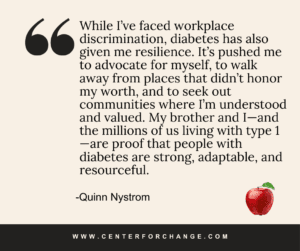Please note that this is an Archived article and may contain content that is out of date. The use of she/her/hers pronouns in some articles is not intended to be exclusionary. Eating disorders can affect people of all genders, ages, races, religions, ethnicities, sexual orientations, body shapes, and weights.
By Quinn Nystrom, MS
November is National Diabetes Awareness Month, and November 14 is World Diabetes Day—the birthday of Dr. Frederick Banting, one of the doctors who discovered insulin. For me, this month is always a personal one. My brother and I have both lived with type 1 diabetes for more than 27 years. It’s a condition that never takes a day off. We manage blood sugars, insulin doses, meals, and supplies every single day.
This year’s World Diabetes Day theme—Diabetes and Well-Being at Work—hits especially close to home, because my workplace hasn’t always been a safe place for me to manage my health.
 The Reality of Discrimination
The Reality of Discrimination
A few years ago, I worked for a boss who told me that if I was ever treating a low blood sugar—say, eating a meal or needing 30 minutes away from my calendar—where I couldn’t immediately answer calls or emails, I’d have to update my Slack profile with an apple emoji so she would “know what I was doing.”
She thought this was kind. But to me, it was discrimination. I was being singled out for managing a medical condition, reduced to a fruit icon to justify why I wasn’t “always on.”
When I reported it to HR, they first paired me with a “talent management” staffer (whatever that means when I’m not an actress, just doing a 9-to-5 marketing gig), who told me I would need to get a doctor’s note confirming I had type 1 diabetes and spelling out my “needs.” And honestly—what the fuck? You want me to prove that my pancreas shut down when I was a kid through no fault of my own? You think that living with diabetes and working a high-stress job comes with a neat little clock schedule—when we need to eat, when medical appointments will be, when a low or high blood sugar will happen? That’s not how this disease works. It doesn’t wait for convenient times.
Eventually, HR informed me that my options were to stay with that boss or submit my resignation. I chose the latter.
The Weight We Carry
Living with type 1 diabetes already demands constant attention. It’s checking numbers, adjusting doses, managing highs and lows, and still trying to show up like everything’s fine. Adding workplace stigma on top of that doesn’t just make life more complicated—it chips away at mental health.
And there’s a real connection here: people with diabetes are at higher risk of mental health conditions like anxiety, depression, and eating disorders. I know that overlap firsthand. When you feel like you have to hide your diabetes at work—or worse, when you’re punished for it—it feeds shame, isolation, and exhaustion.
Why This Year’s Theme Matters
“Know more and do more for diabetes at work.” That’s the call for this year’s World Diabetes Day. And I believe it starts with creating workplaces where employees don’t have to apologize for taking care of themselves.
Supporting people with diabetes doesn’t take much:
· Flexibility for breaks to eat or check blood sugars.
· An environment where health needs are respected, not questioned.
· Leadership that understands diabetes is part of someone’s life, not a flaw in their performance.
When employers get this right, employees thrive. And when employees thrive, workplaces thrive.
A Hope for Change—and a Note on Resilience
This November, my hope is that more companies start listening. Because people like my brother and me—and millions of others—deserve workplaces where we can show up fully, without fear of stigma or punishment for caring for our health.
But I also want to end on this: while I’ve faced discrimination, diabetes has also given me resilience. It’s pushed me to advocate for myself, to walk away from places that didn’t honor my worth, and to seek out communities where I’m understood. My brother and I—and the millions of us living with type 1—are proof that people with diabetes are strong, adaptable, and resourceful.
To anyone living with diabetes and struggling at work: you are not alone. And to the employers out there—I hope you’ll take this World Diabetes Day as an opportunity to do more, learn more, and start the change toward a better #DiabetesLife for your employees.
Because while diabetes may be a part of us, it does not define our value.
















